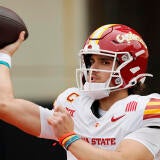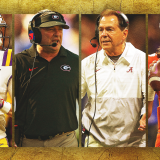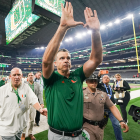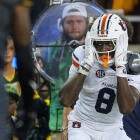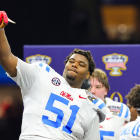Big Ten football announces return to play 2020 season on Oct. 24 with unique schedule, daily rapid testing
The Big Ten will also require positive athletes to receive a cardiac clearance in order to play
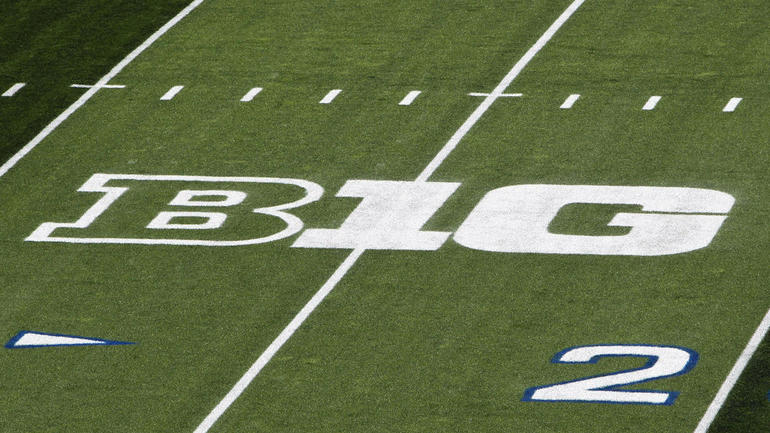
The Big Ten announced Tuesday that its Council of Presidents and Chancellors has voted to allow the league to play football in fall 2020. The Big Ten will open its season on the weekend of Oct. 24 with teams playing eight regular-season games over eight weeks along with a Big Ten Championship Game and six additional consolation games.
The Big Ten Championship Game is scheduled for Dec. 19, making the Big Ten eligible or the College Football Playoff as the final CFP Rankings announcement of the season is set or Dec. 20.
The Big Ten will also play league consolation games with teams placing second- through seventh-place in their divisions matching up on Dec. 19. There may be adjustments to those games, however, as Wisconsin athletic director Barry Alvarez said the Big Ten will try to avoid repeat matchups if teams had already played in the regular season.
Tickets will not be sold and fans will not be allowed to attend games this season, though exceptions may be made for families of athletes, coaches and staff.
The conference will now feature daily, rapid COVID-19 testing as a focal point of its return to play plan. Testing for athletes and coaches will begin on Sept. 30. The earliest an athlete could return to game competition is 21 days following a positive diagnosis. Additionally, the Big Ten unveiled new information on its plans for myocarditis screening in the wake of any positive tests. Both of those were major concerns that were among the main reasons for the Big Ten's original decision to cancel fall football on Aug. 11.
From the Big Ten's release:
Each institution will designate a Chief Infection Officer (CInO) who will oversee the collection and reporting of data for the Big Ten Conference. Team test positivity rate and population positivity rate thresholds will be used to determine recommendations for continuing practice and competition. All COVID-19 positive student-athletes will have to undergo comprehensive cardiac testing to include labs and biomarkers, ECG, Echocardiogram and a Cardiac MRI. Following cardiac evaluation, student-athletes must receive clearance from a cardiologist designated by the university for the primary purpose of cardiac clearance for COVID-19 positive student-athletes.
Regarding positivity rates, the Big Ten will use data provided by CInO to make decisions continuing practice and competition based on a seven-day rolling average. Enhanced prevention will begin once team positivity rates reach 2-5%. When a team positivity rate goes over 5% and when the team's rostered players plus the group of coaches and staff's positivity rate goes over 7.5%, a Big Ten team will stop practice or competition for a minimum of seven days.
The Big Ten initially canceled football until spring 2021 amid questions about COVID-19 testing and tracing, along with long-term heart issues that have been reported in some patients with coronavirus.
A Return to Play Task Force was created by the Big Ten to evaluate its options for either starting in spring 2021 or finding a way to play this fall. Its medical subcommittee met Saturday with eight of the league's presidents and chancellors, according to multiple reports, to share updated medical information, including the availability of more widespread rapid response antigen testing that could allow teams to test daily while decreasing the need for contact tracing. Additionally, new information about myocarditis -- an inflammation of the heart muscle -- was shared. Part of the Big Ten's decision to eschew football for a later date was based on a study outlining concerns over myocarditis and its links to COVID-19.
The revote comes amid considerable backlash for the Big Ten's initial cancellation decision, which went 11-3 with only Ohio State, Nebraska and Iowa electing to play football. Most notably, the conference and commissioner Kevin Warren received pushback for their muddled message and inability to get on the same page from the member presidents on down to the coaches and players. The Big Ten has since fought a multi-front public relations battle as it received pressure from players, coaches, parents and even President Donald Trump.
In an open letter eight days after canceling football, Warren said that the Big Ten's decision would not be revisited. That has obviously changed. To reverse the vote, the league needs nine of 14 presidents voting in the affirmative to play, meaning six who previously voted to cancel football have to change course.
Despite the delayed start, there remain numerous roadblocks for an actual return to football. Wisconsin football and hockey, for example, recently paused for two weeks after a rash of COVID-19 positives. Meanwhile, games across the country continue to be postponed left and right. Virginia-Virginia Tech, Houston-Memphis, Army-BYU and SMU-TCU are just some of the 13 games that have already been postponed; some games may be canceled if new dates are not easily achieved.





